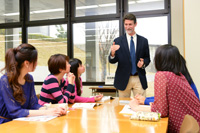英語科目
バランスの取れた英語の基礎力を目指す必修科目と、ニーズやレベルに合わせて履修できる選択必修科目の二本立てで、着実に英語力を伸ばしていきます。

専門レベルの研究をするためにも、実務能力を身につけるためにも、英語はあらゆる分野の基礎になります。英語科目では、「読む、書く、聞く、話す」を徹底的に学習し、さらに「考える」力をつけることにより、本当の意味の「英語でコミュニケートできる人物」を養成することを目標としています。
必修科目
- 英語I 他者と共に生きる:人とのつながりと人生の意味を探究する
- 英語Ⅱ 異文化との遭遇:他者を理解し尊重する
- 英語Ⅲ 日本における社会問題:より良いコミュニティーを目指して
- 英語Ⅳ 日本と世界:国際社会で生きる
- TOEIC対策講座Ⅰ・Ⅱ TOEICのスコア向上のための実践的なスキル習得
選択必修科目
開講科目紹介
- 基礎英語スキルズ(文法・語彙)
- 標準英語スキルズ(職場の英語)
- 標準英語スキルズ(メディア・ニュースの英語)
- 標準英語スキルズ(ディスカッション)
- 標準英語スキルズ(日本の文化)
- 準上級英語スキルズ(TOEICスピーキング・ライティング対策)
- 準上級英語アカデミックスキルズ(多読速読)
- 上級英語スキルズ(編入対策)
- 上級英語スキルズ(SDGs) など
講義内容(シラバス)は、こちらをご覧ください。
